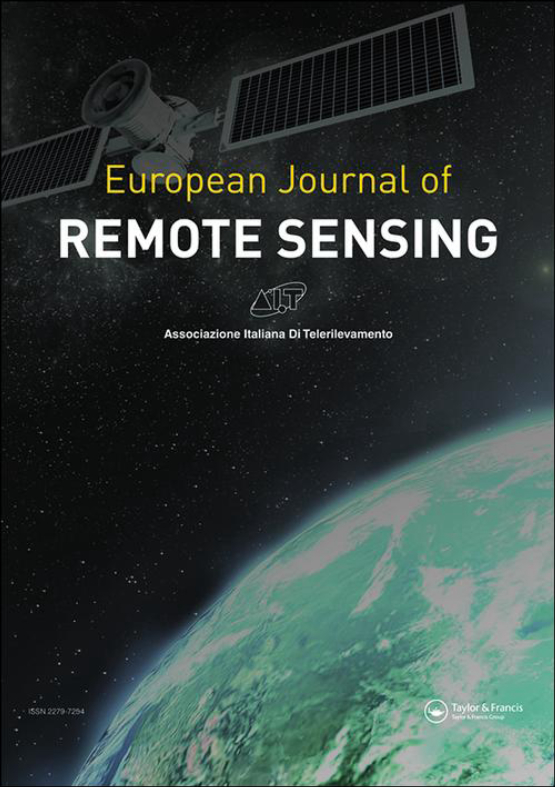Submit a Manuscript to the Journal
European Journal of Remote Sensing
For an Article Collection on
Innovations in AI and Earth Observation methods and data to tackle global challenges
Manuscript deadline
30 October 2024

Article collection guest advisor(s)
Julio Cesar Pedrassoli, Ph.D.,
Federal University of Bahia (UFBA), Brazil
Lorraine Trento Oliveira, MSc,
University of Twente (UT), The Netherlands
Monika Kuffer, Ph.D.,
University of Twente (UT), The Netherlands
Innovations in AI and Earth Observation methods and data to tackle global challenges
Earth Observation (EO) has a fundamental role in studying, mapping and monitoring human and natural processes of our planet. In the past decades, top-notch sensor data has become increasingly accessible, generating tremendous amounts of raw spatial(-temporal) data. Today, we see rapid advancements in Artificial Intelligence (AI) methods to extract and derive valuable information for decision-making processes. Particularly Machine Learning (ML) techniques have been widely used for data mining, processing, image recognition, classification and prediction in various areas of science. However, the integration of EO and AI methods is still in an early stage of development, especially with the speed at which technology advances. This combination has the power for transformative solutions, as well as risks (e.g., biases, ethics). Therefore, intensive (cross-disciplinary) research is much needed towards developing EO solutions to support pressing societal and environmental global challenges.
Our world experiences rapid transformations and pressing challenges like never before. We are already facing severe impacts of climate change, crises, conflicts, disasters, access to resources, and inequalities that are expected to become worse with every passing year. There are uncountable transnational risks to be urgently addressed (e.g., loss of biodiversity, water safety, heatwaves, flooding, health pandemics, poverty, etc). In many cases, their spatial aspects are not well understood, and data are not readily available. AI and EO have the potential to promote novel approaches and generate new knowledge and information to assist in solutions to these problems. There is a massive amount of available spatial data and ongoing technological advancements in computing that can thereupon integrate and support informed better policymaking.
The field of AI interacts with EO data in a number of ways. The models integrate variables, constraints and processes of Earth and Social systems. Although efforts have been showing great success in their tasks, innovations are required to provide robust and accountable systems. Advancements in the subtopics of user-centric approaches, deep learning, advanced image processing and analysis, and transfer learning are moving towards improved AI methods. Subtopics in the innovation in big geodata, such as crowdsourcing and citizen-generated data and the integrated application with AI in socially relevant problems (including ethical challenges) is one of the goals of this collection, particularly regarding the active role of the users.
Julio Cesar Pedrassoli, Ph.D. is the holder of a Ph.D. in Human Geography from USP, specialising in Remote Sensing for dynamic spatiotemporal analysis. Research expertise lies in mapping urban expansion and understanding housing-poverty dynamics in the Global South using Earth Observation Data and Artificial Intelligence. Serving as a Professor and Researcher at UFBA since 2014, with consulting roles at the Pólis Institute. Previous Research Scholar at Columbia University, employing advanced spectral mixture models for comprehensive Earth surface change studies. Currently, coordinating urbanised area mapping for the MapBiomas project and holds a position on the Steering Committee of the IGU Urban Commission. Institutional webpage link;ORCID: 0000-0001-9762-102X
Lorraine Trento Oliveira, MSc is a PhD candidate at Faculty ITC (University of Twente, NL), specialising in Earth Observation and Citizen Science techniques for climate vulnerability assessments. Holds an MSc also from ITC with focus on unsupervised machine learning for mapping deprived areas. She is one of the winners of the Tech Ethics Lab 2022 funding. Her expertise lies in spatial analysis with geoAI, poverty and vulnerability dynamics. Institutional webpage link; ORCID: 0000-0002-2707-8006
Monika Kuffer Ph.D. is Associate Professor at the Faculty ITC (the University of Twente, The Netherlands). Her research focuses on sustainable development (SDGs), socioeconomic and environmental deprivation, and living quality in urban/rural environments using remote sensing, Geographic Information Systems (GIS), and AI-based methods. She co-chairs an international network on deprivation area mapping IDEAMAPS and (co) leads several research projects on inequalities and environment, e.g., IDEAtlas, ONEKANA and is the Dutch representative of the European Association of Remote Sensing Laboratories (EARSeL), SIG chair Global South, and a member of the Steering Committee: EO for Sustainable Cities and Communities Toolkit. Institutional webpage link; ORCID: 0000-0002-1915-2069
Benefits of publishing open access within Taylor & Francis
Global marketing and publicity, ensuring your research reaches the people you want it to.
Article Collections bring together the latest research on hot topics from influential researchers across the globe.
Rigorous peer review for every open access article.
Rapid online publication allowing you to share your work quickly.
Looking to Publish your Research?
Find out how to publish your research open access with Taylor & Francis Group.
Choose open accessSubmission Instructions
All manuscripts submitted to this Article Collection will undergo desk assessment and peer-review as part of our standard editorial process. Guest Advisors for this collection will not be involved in peer-reviewing manuscripts unless they are an existing member of the Editorial Board. Please review the journal Aims and Scope and author submission instructions prior to submitting a manuscript.